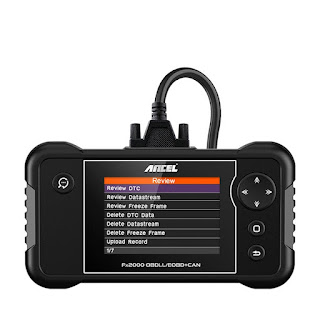Unlocking Your Car's Secrets: The Power of OBD2 Scanners
In today's digital age, cars are more than just machines; they're sophisticated computers on wheels, equipped with a plethora of sensors and diagnostic systems designed to monitor performance, detect issues, and optimize efficiency. To tap into the wealth of information hidden within your car's onboard computer, you need the right tool: the OBD2 scanner. In this comprehensive guide, we'll delve into the world of car obd2 scanner, exploring their functions, benefits, and how they empower drivers to take control of their vehicles' health and performance.
Understanding OBD2 Scanners
OBD2 stands for On-Board Diagnostics, 2nd Generation, and it refers to the standardized diagnostic system mandated by the U.S. Environmental Protection Agency (EPA) for all vehicles manufactured from 1996 onwards. OBD2 scanners are handheld devices that connect to a car's OBD2 port, allowing users to access and interpret diagnostic trouble codes (DTCs) generated by the vehicle's onboard computer.
Functions of OBD2 Scanners
Read and Clear Trouble Codes: One of the primary functions of OBD2 scanners is to read and clear trouble codes stored in the vehicle's onboard computer. These codes indicate potential issues with various systems and components, such as the engine, transmission, emissions, and more. By retrieving and deciphering these codes, drivers can diagnose problems and take corrective action before they escalate.
Live Data Monitoring: OBD2 scanners allow users to monitor live data streams from various sensors and systems in real-time. This includes parameters such as engine speed, coolant temperature, oxygen sensor readings, fuel trims, and more. By analyzing live data, drivers can identify abnormalities, diagnose performance issues, and make informed decisions about maintenance and repairs.
Performance Tuning: Some advanced OBD2 scanners offer performance tuning capabilities, allowing users to modify engine parameters and optimize performance. This includes adjusting fuel maps, ignition timing, throttle response, and other settings to enhance power, fuel efficiency, and drivability.
Emission Testing: OBD2 scanners play a crucial role in emission testing and compliance. They can retrieve emissions-related data stored in the vehicle's computer, including readiness monitors, diagnostic trouble codes, and emissions-related parameters. This information helps technicians diagnose and repair emissions-related issues, ensuring compliance with environmental regulations.
Benefits of Using OBD2 Scanners
Cost Savings: OBD2 scanners empower drivers to diagnose and troubleshoot issues themselves, reducing the need for costly trips to the dealership or mechanic. By identifying problems early and performing timely repairs, drivers can prevent more extensive and expensive damage down the road.
Increased Awareness: OBD2 scanners provide valuable insight into your vehicle's health and performance, allowing you to stay informed about potential issues before they become serious problems. By understanding your car's diagnostic codes and live data streams, you can make proactive decisions to maintain and optimize your vehicle's performance.
Empowerment: OBD2 scanners put the power of diagnostics and repair in the hands of drivers, allowing them to take control of their vehicles' maintenance and performance. With the right tools and knowledge, drivers can diagnose and address issues quickly and effectively, reducing downtime and improving overall reliability.
Peace of Mind: By regularly scanning your vehicle with an OBD2 scanner, you can enjoy peace of mind knowing that your car is operating at peak performance and that any potential issues are being addressed promptly. OBD2 scanners provide reassurance and confidence on the road, allowing you to focus on enjoying the driving experience.
Choosing the Right OBD2 Scanner
When selecting an OBD2 scanner, consider the following factors:
Compatibility: Ensure that the OBD2 scanner is compatible with your vehicle's make, model, and year. Different vehicles may use different communication protocols and connector types, so it's essential to choose a scanner that supports your specific vehicle.
Features: Consider the features and capabilities offered by the OBD2 scanner, such as live data monitoring, performance tuning, and compatibility with third-party apps and software. Choose a scanner that meets your needs and budget while offering the functionality you require.
Ease of Use: Look for an OBD2 scanner that is easy to use and navigate, with a user-friendly interface and intuitive controls. A scanner with clear instructions and helpful prompts can make the diagnostic process more efficient and enjoyable.
Reliability and Support: Select an OBD2 scanner from a reputable manufacturer with a track record of reliability and customer support. Read reviews and testimonials from other users to gauge the quality and performance of the scanner before making a purchase.
Conclusion
Car OBD2 scanners are indispensable tools for modern drivers, providing valuable insight into vehicle diagnostics, performance, and emissions. By harnessing the power of OBD2 scanners, drivers can diagnose issues, optimize performance, and stay informed about their vehicle's health and efficiency. With their cost-saving benefits, empowerment, and peace of mind, OBD2 scanners are essential companions for drivers seeking to take control of their vehicles' maintenance and performance. Invest in an OBD2 scanner today and unlock the secrets hidden within your car's onboard computer.




Comments
Post a Comment